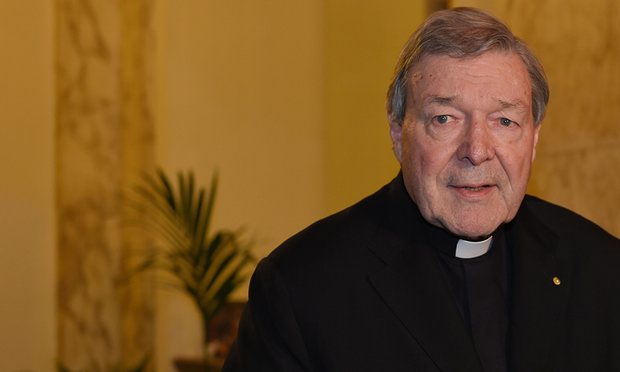How Long Can the Cognitive Dissonance between My Faith and the Catholic Church Last?
By Kristina Keneally
A Facebook reminder from 2008 popped up in my husband’s newsfeed last week. It was a photo from World Youth Day in Sydney. He sent me the link with a note, “Hard to believe that this was just eight years ago.” Just eight years ago, Australia’s Cardinal George Pell walked the streets of Sydney unencumbered, basking in the glow of World Youth Day and the adulation of its 250,000 young attendees. The royal commission into institutional responses to sexual abuse hadn’t taken place. The Irish government hadn’t yet released its official report into sexual abuse in the Catholic church in that country. No one had seen the movie Spotlight. Most people assumed the isolated reports of clerical sexual abuse of children were just that – isolated. Eight years later, and another round of World Youth Day celebrations has just finished, held this time in Poland. Around 2.5 million young people from across the globe attended. Pope Francis used the five-day celebration to speak to young Catholics about issues as diverse as terrorism, poverty, and technology. He also spoke about faith and God’s call to them. He was – as you might expect for such a popular pope – very well received. Then Francis left World Youth Day, got on a plane home and spent his time on the flight talking to journalists about police investigations into allegations of child sexual abuse against Pell. This juxtaposition is jarring, to say the least. At its best, the Catholic church can ignite passion and compassion in its young believers. It can inspire young adult Catholics to great acts of social justice and service to their fellow human beings. By preaching and practicing the gospel, the Catholic church can fire up its youth to practical action on poverty, inequality, injustice, homelessness, the environment and welcoming refugees. Faith-filled young Catholics at every World Youth Day turnout in throngs – sometimes in the millions – filled with love of God and happiness to be alive. Sydney witnessed this first-hand when World Youth Day came to this cynical town in 2008. From the moment the first pilgrims landed at Kingsford-Smith airport they charmed the city with their faith, generosity and joy. At its worst though, the Catholic church is diabolical to young people. Across the world the church has presided over the grotesque phenomenon of clerical sexual abuse of children, and compounded its sins with weak, pathetic decisions by priests and bishops to hide these crimes. By ignoring the gospels, the Catholic church had visited horrors on thousands of young people. Depression, self-harm, mental breakdown, and suicide are but some of the terrible impacts affecting abused Catholics. Australia has witnessed this first-hand through the testimony at the royal commission into institutional responses to sexual abuse. Five thousand submissions relating to the Catholic church were made to the commission. Their stories are harrowing. Their testimony is raw. Among the most riveting days at the royal commission are the days Cardinal George Pell has testified about what he knew or didn’t know about allegations of child sexual abuse, and what he did or didn’t do to investigate and prevent abuse. And now we have allegations of sexual abuse of children in the 1970s, levelled directly against Pell, aired in detail last week on the ABC. Victorian police confirm that they are investigating and, at this stage, have not interviewed Pell. Pell has issued a statement categorically denying the allegations. Pope Francis has said the cardinal shouldn’t be tried in the media, and that police investigations should take their course. He also said there was “doubt” about these allegations. For the rest of us in Australia, including the people who have made the complaints, all we can do is wait for the police to make a call about whether there is doubt, or proof. Meanwhile, I wish I could explain this juxtaposition to my children. I wish I could explain it to myself. How does an institution that can do so much good for the world also be responsible for such evil? How can a church that can gather young people on such a joyful celebration like World Youth Day also prompt the terrifying testimony we hear from survivors of child sexual abuse? How long can I keep cognitive dissonance going between my relatively positive experience of faith in Jesus Christ, and the mounting evidence that the institution that has transmitted and supported that faith is tragically flawed? And how do I raise my kids in the Catholic faith, helping them to grasp the good in the gospel despite the bad in the church that transmits it? If the emptying pews at Australian parishes, and the swelling numbers of children enrolled in Australian Catholic schools are anything to go by, I’m not alone in asking these questions. On Wednesday, the pope announced a commission of eight women and eight men to study the question of women deacons. There would have been a time – certainly eight years ago – that I would have ecstatically welcomed this news. Now it seems like a good, small step but in no way big enough to address the systemic, chronic challenges the church’s leadership faces. In days past, Australian Catholics might have looked to our cardinal for guidance. The sad reality is today all we can do is look to the Victorian police to see if the cardinal is about to be charged. How much has changed. In just eight years.
|
.
Any original material on these pages is copyright © BishopAccountability.org 2004. Reproduce freely with attribution.
